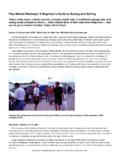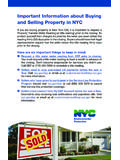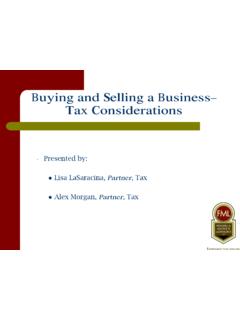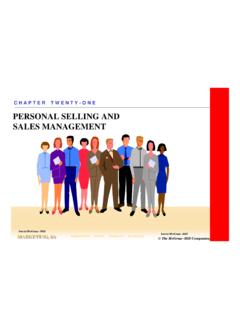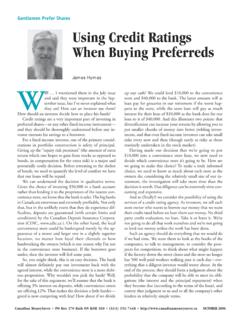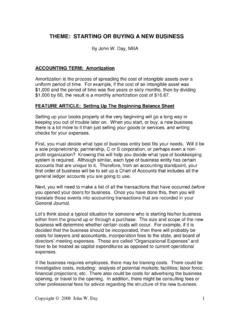Transcription of Selling The Invisible - Knowledge Capital
1 Selling the Invisible Highlights Almost three out of four Americans work in service. A service does not exist when you buy it. You cannot see, touch or try out a haircut before you buy it. You usually know when a product fails - it stops working. How do you know when the service fails? Services cannot be warranted because the outcome is so often not measurable. Service acts and processes cannot be easily routinized. We usually don't take product failures personally. However, services are usually provided by people we have met and we blame them when our expectations are not met. Services are often bought because they are needed, while products are bought because they are wanted. Often when Selling products the support services makes or breaks it. This is what adds the value. Better reality in your service will make marketing easier, cheaper and more profitable.
2 Fix your service before you start advertising. Too often service sucks. The average person thinks he is above average. Sixty percent of students said they were in the top 10% in getting along with others. Ninety-four percent of University professors say they are doing a better job than their average colleague. Most men think they are good looking. Assume your service is bad. It can't hurt and it will force you to improve it. How can McDonald's deliver spotless rest rooms and world-class French fries in 50 seconds for 79 cents? Forget the excuses - do it. Who sets your standards: the industry, your ego or your clients? Our expectations have been raised by McDonald's, Walt Disney and Federal Express. Develop new benchmarks of service quality. The Butterfly effect: Tiny efforts huge results - Tiny Cause - Huge Effect.
3 Hire the right people. When you make mistakes, how you treat the customer is critical. Write an ad for your service. If, after a week, the ad is weak, stop working on the ad and start working on your service. Delta was the best airline. American developed Sabre electronic reservations. Travel agents found it easier to book through American. Delta's heart was Customer Service but it didn't have the "brains" to support it. Don't just think better, think differently. Is this viable anymore? Is this what the world wants? Have we added capabilities or skills that suggest we should enlarge our scope? Should we develop or acquire related skills and capabilities? Should we narrow our scope and leverage our specialized skills? Stage one is product driven. Give the customer the basic model - The Model T. Stage two is Market Driven.
4 Offer the desired product - the fully loaded Lincoln. Stage three is going beyond client's expectations and expressed needs: heated car seats, consoles that tilt towards the driver (Lexus quality). Surveying Even your best friends won't tell you. Have a third party do your surveys. Your customers appreciate the survey. They'll see you are trying to improve Written surveys can be ambiguous, , How do you define quality. Beckwith recommends doing it by phone. His concern about Focus Groups is that the dominant people will prevail. You are Selling individuals; talk to individuals. A voice conveys feelings that words can hide. Never ask "What don't you like?" You are asking someone to admit they made a bad decision. Marketing is not a department; it is your business. Everyone in your company is responsible for marketing your company.
5 Seeing the real scope of your business is hard. Ask for help. You are in a tunnel, talking about yourself. You need to know about your customers and prospects. Don't open a shop unless you know how to smile. Every act is a marketing act. Make every employee a marketing person. WHAT ARE YOU GOOD AT? In planning your marketing, don't just think of your business. Think of your skills. Your strength might be outside your industry (particularly if your industry is mature). Find out what clients are really buying. McDonald's is Selling an experience. Burger King's better flame broiled burger did not win over the customers. THIS IS (FOR ME) THE MOST IMPORTANT SECTION IN THE BOOK: Most companies in Expert Services (Professionals) think their clients are buying expertise. Most of your prospects cannot evaluate your expertise.
6 They can't identify a good tax return or a great diagnosis. They can tell if the relationship is good. Clients know if they feel valued. Your professional expertise is assumed - you are Selling a relationship. Before you try to satisfy "the client," understand and satisfy the person. Who are your competitors? They include the customer who does nothing or does it himself. Your client has four options: Use you, Use someone else, Do it themselves, Do nothing. Your biggest competitor can be your prospects. Go where others aren't. Who can you serve that is not being served? Every service company should have a director of technology. A lack of technology will hamper you. Your competitors will leap ahead if they have better technology. "Have we carefully considered innovative ways that new technology can be used to improve our service and grow our business?
7 " Study every point at which your company makes contact with a prospect. Your receptionist, business card, office, brochure, sales call. What are you doing to make a PHENOMENAL IMPRESSION at every point?" Does your client feel respected, amazed, impressed, delighted? Study each point of contact. Then improve each one - significantly. School teaches us that technical competence ensure success. In large part, service marketing is a popularity contest. Your competence, your excellence, your talent - just pay the entry fee. Be professional - but more importantly - be personable. Planning - The 18 Fallacies 1. Forecasting the future is impossible. The baby boom was supposed to create unemployment in the 60s. Women were not supposed to enter the workforce. Still there were plenty of jobs. Labour force grew 40%; number of jobs grew 50% Many people would work from home; not as many as expected.
8 VCRs were going to kill the movie business. Look at the new theaters. TV was going to kill books. Don't tell Chapters. Books get promoted on talk shows, etc. Smoking. No one should, but they do. Healthy eating - we should but so, why are so many fast food and steak houses doing so well? Plan for several possible futures (outcomes?). 2. How do you know what you want? Accept the limitations of planning. Don't value planning for its results. It's the process that counts. Don't plan your future; plan your people. 3. Tactics are more important than strategy. Do something, correct it and go again. 4. The better mousetrap? NO! Marginal strategies executed passionately almost always outperform brilliant strategies executed marginally. 5. Today's good ideas will almost always beat out tomorrow's better one. Do it now.
9 Don't wait. 6. Act like a shark - keep moving. 7. Think dumb. Smart ideas often develop from dumb ones. 8. The research shows .. planning is not a precise science. Mistrust "facts". Planning is an imprecise act. 9. Beware of focus groups. They focus on today. Planning is for tomorrow. 10. Beware of what you think you remember. 11. Have a healthy mistrust of what experience has taught you. 12. The Fallacy of Confidence Our customers buy on price. Telemarketing does not work with this audience. Our clients won't pay for higher quality, even if we could achieve it. Opinions become "facts". Maybe others are right and you are wrong! 13. Perfection Very good Good Best Not good Truly god-awful Being best can be too complicated - Aiming for perfection can be stifling. 14. Failure is failure. Start failing and you can start succeeding.
10 Fix as you go. 15. Expertise: Don't look to experts for all your answers. There are no answers, only informed opinions. 16. Authority: The bosses have authority. The people with the good ideas often don't. The bosses have much to lose. They protect their positions. Listen to others. 17. Common sense can be a shield, not a sword. For inspiring results, you need inspiration. 18. The Fallacy of Fate - You gotta believe. "We tried that. It didn't work." TRY IT (OR A VARIATION) AGAIN. HOW PROSPECTS THINK Why do people buy what they buy? Why use American Express credit card? No logical reason why there are 25 Million in the US. Choosing the familiar. Familiarity breeds business. Spread your word however you can. The Recency Effect. Follow up brilliantly. Have a well thought out follow up approach. Choosing "Good Enough.

